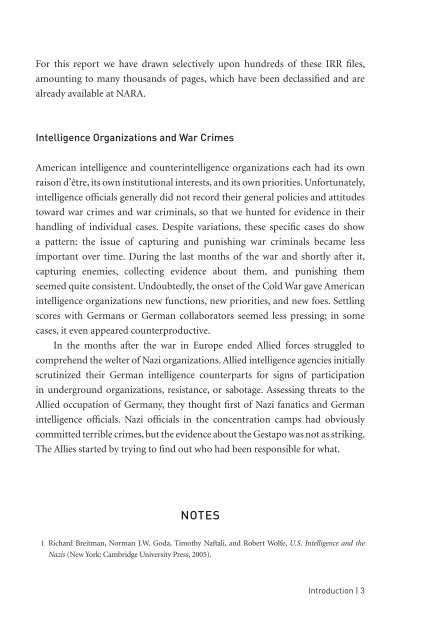hitlers-shadow
hitlers-shadow
hitlers-shadow
You also want an ePaper? Increase the reach of your titles
YUMPU automatically turns print PDFs into web optimized ePapers that Google loves.
For this report we have drawn selectively upon hundreds of these IRR files,<br />
amounting to many thousands of pages, which have been declassified and are<br />
already available at NARA.<br />
Intelligence Organizations and War Crimes<br />
American intelligence and counterintelligence organizations each had its own<br />
raison d’être, its own institutional interests, and its own priorities. Unfortunately,<br />
intelligence officials generally did not record their general policies and attitudes<br />
toward war crimes and war criminals, so that we hunted for evidence in their<br />
handling of individual cases. Despite variations, these specific cases do show<br />
a pattern: the issue of capturing and punishing war criminals became less<br />
important over time. During the last months of the war and shortly after it,<br />
capturing enemies, collecting evidence about them, and punishing them<br />
seemed quite consistent. Undoubtedly, the onset of the Cold War gave American<br />
intelligence organizations new functions, new priorities, and new foes. Settling<br />
scores with Germans or German collaborators seemed less pressing; in some<br />
cases, it even appeared counterproductive.<br />
In the months after the war in Europe ended Allied forces struggled to<br />
comprehend the welter of Nazi organizations. Allied intelligence agencies initially<br />
scrutinized their German intelligence counterparts for signs of participation<br />
in underground organizations, resistance, or sabotage. Assessing threats to the<br />
Allied occupation of Germany, they thought first of Nazi fanatics and German<br />
intelligence officials. Nazi officials in the concentration camps had obviously<br />
committed terrible crimes, but the evidence about the Gestapo was not as striking.<br />
The Allies started by trying to find out who had been responsible for what.<br />
NOTES<br />
1 Richard Breitman, Norman J.W. Goda, Timothy Naftali, and Robert Wolfe, U.S. Intelligence and the<br />
Nazis (New York: Cambridge University Press, 2005).<br />
Introduction | 3


